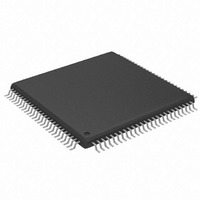PIC32MX460F512L-80I/PT Microchip Technology, PIC32MX460F512L-80I/PT Datasheet - Page 574

PIC32MX460F512L-80I/PT
Manufacturer Part Number
PIC32MX460F512L-80I/PT
Description
IC PIC MCU FLASH 512K 100-TQFP
Manufacturer
Microchip Technology
Series
PIC® 32MXr
Datasheets
1.MA320002.pdf
(208 pages)
2.DM320001.pdf
(44 pages)
3.PIC32MX320F032H-40IPT.pdf
(48 pages)
4.PIC32MX320F032H-40IPT.pdf
(66 pages)
5.PIC32MX320F032H-40IPT.pdf
(22 pages)
6.PIC32MX460F256L-80IPT.pdf
(632 pages)
7.PIC32MX320F064H-40IMR.pdf
(172 pages)
Specifications of PIC32MX460F512L-80I/PT
Program Memory Type
FLASH
Program Memory Size
512KB (512K x 8)
Package / Case
100-TFQFP
Core Processor
MIPS32® M4K™
Core Size
32-Bit
Speed
80MHz
Connectivity
I²C, IrDA, LIN, PMP, SPI, UART/USART, USB OTG
Peripherals
Brown-out Detect/Reset, DMA, POR, PWM, WDT
Number Of I /o
85
Ram Size
32K x 8
Voltage - Supply (vcc/vdd)
2.3 V ~ 3.6 V
Data Converters
A/D 16x10b
Oscillator Type
Internal
Operating Temperature
-40°C ~ 85°C
Processor Series
PIC32MX4xx
Core
MIPS
Data Bus Width
32 bit
Data Ram Size
32 KB
Interface Type
I2C , SPI , UART
Maximum Clock Frequency
80 MHz
Number Of Programmable I/os
85
Number Of Timers
5 x 16 bit, 1 x 32 bit
Operating Supply Voltage
2.3 V to 3.6 V
Maximum Operating Temperature
+ 85 C
Mounting Style
SMD/SMT
3rd Party Development Tools
52713-733, 52714-737
Development Tools By Supplier
PG164130, DV164035, DV244005, DV164005, DM320003, DM320002, MA320002
Minimum Operating Temperature
- 40 C
On-chip Adc
10 bit
Controller Family/series
PIC32
No. Of I/o's
85
Ram Memory Size
32KB
Cpu Speed
80MHz
No. Of Timers
6
Embedded Interface Type
EUART, I2C, PSP, SPI
Rohs Compliant
Yes
Lead Free Status / RoHS Status
Lead free / RoHS Compliant
For Use With
876-1000 - PIC32 BREAKOUT BOARDAC244003 - TEST BD MPLAB REAL ICE LOOPBACKDM320003 - BOARD DEMO USB PIC32 OTGAC244006 - KIT MPLAB REAL ICE TRACEAC164333 - MODULE SKT FOR PM3 100QFP
Eeprom Size
-
Lead Free Status / Rohs Status
Lead free / RoHS Compliant
Available stocks
Company
Part Number
Manufacturer
Quantity
Price
Company:
Part Number:
PIC32MX460F512L-80I/PT
Manufacturer:
VISHAY
Quantity:
3 200
Company:
Part Number:
PIC32MX460F512L-80I/PT
Manufacturer:
Microchip Technology
Quantity:
10 000
- MA320002 PDF datasheet
- DM320001 PDF datasheet #2
- PIC32MX320F032H-40IPT PDF datasheet #3
- PIC32MX320F032H-40IPT PDF datasheet #4
- PIC32MX320F032H-40IPT PDF datasheet #5
- PIC32MX460F256L-80IPT PDF datasheet #6
- PIC32MX320F064H-40IMR PDF datasheet #7
- Current page: 574 of 632
- Download datasheet (10Mb)
PIC32MX3XX/4XX
28.2.1.5
The JTAG interface can also be used to program
PIC32MX3XX/4XX devices in their target applications.
Using EJTAG with the JTAG interface allows application
designers to include a dedicated test and programming
port into their applications, with a single 4-pin interface,
without imposing the circuit constraints that the ICSP
interface may require.
28.2.1.6
Enhanced EJTAG programming uses the standard
JTAG interface but uses a programming executive writ-
ten to RAM. Use of the programming executive with the
JTAG interface provides a significant improvement in
programming speed.
28.2.2
28.2.2.1
ICSP also provides a hardware channel for the In-Cir-
cuit Debugger (ICD) which allows externally controlled
debugging of software. Using the appropriate hardware
interface and software environment, users can force
the device to single step through its code, track the
actual content of multiple registers and set software
breakpoints.
The active ICSP debugger port is selected by the ICS
Configuration bit.
28.2.2.2
The industry standard EJTAG interface allows third
party EJTAG tools to be used for debugging. Using the
EJTAG interface, memory and registers can be viewed
and modified. Breakpoints can be set and the program
execution may be stopped, started or single stepped.
28.2.3
To aid in debugging applications certain I/O peripherals
have a user-controllable bit to override the Freeze func-
tion in the peripheral. This allows the module to
continue to send any data, buffered within the periph-
eral, even when a debugger attempts to halt the periph-
eral. The Debug mode control bits for these peripherals
are contained in the DDPCON register.
28.2.4
The JTAG boundary scan method is the process of
adding a Shift register stage adjacent to each of the
component’s I/O pins. This permits signals at the com-
ponent boundaries to be controlled and observed,
using a defined set of scan test principles. An external
tester or controller provides instructions and reads the
results in a serial fashion.
DS61143B-page 572
DEBUGGING
SPECIAL DEBUG MODES FOR
SELECT COMMUNICATIONS
PERIPHERALS
JTAG BOUNDARY SCAN
EJTAG Device Programming Using
the JTAG Interface
Enhanced EJTAG Programming
Using the JTAG Interface
ICSP and In-Circuit Debugging
EJTAG Debugging
Preliminary
The external device also provides common clock and
control signals. Depending on the implementation,
access to all test signals is provided through a
standardized, 4-pin interface.
A typical application incorporating the JTAG boundary
scan interface is shown in Figure 28-3. In this example,
a PIC32MX3XX/4XX microcontroller is daisy-chained
to a second JTAG compliant device. Note that the TDI
line from the external tester supplies data to the TDI pin
of the first device in the chain (in this case, the micro-
controller). The resulting test data for this two-device
chain is provided from the TDO pin of the second
device to the TDO line of the tester.
This section describes the JTAG module and its gen-
eral use. Users interested in using the JTAG interface
for device programming should refer to the appropriate
PIC32MX3XX/4XX device programming specification
for more information.
© 2008 Microchip Technology Inc.
Related parts for PIC32MX460F512L-80I/PT
Image
Part Number
Description
Manufacturer
Datasheet
Request
R

Part Number:
Description:
Manufacturer:
Microchip Technology Inc.
Datasheet:

Part Number:
Description:
Manufacturer:
Microchip Technology Inc.
Datasheet:

Part Number:
Description:
Manufacturer:
Microchip Technology Inc.
Datasheet:

Part Number:
Description:
Manufacturer:
Microchip Technology Inc.
Datasheet:

Part Number:
Description:
Manufacturer:
Microchip Technology Inc.
Datasheet:

Part Number:
Description:
Manufacturer:
Microchip Technology Inc.
Datasheet:

Part Number:
Description:
Manufacturer:
Microchip Technology Inc.
Datasheet:

Part Number:
Description:
Manufacturer:
Microchip Technology Inc.
Datasheet:











